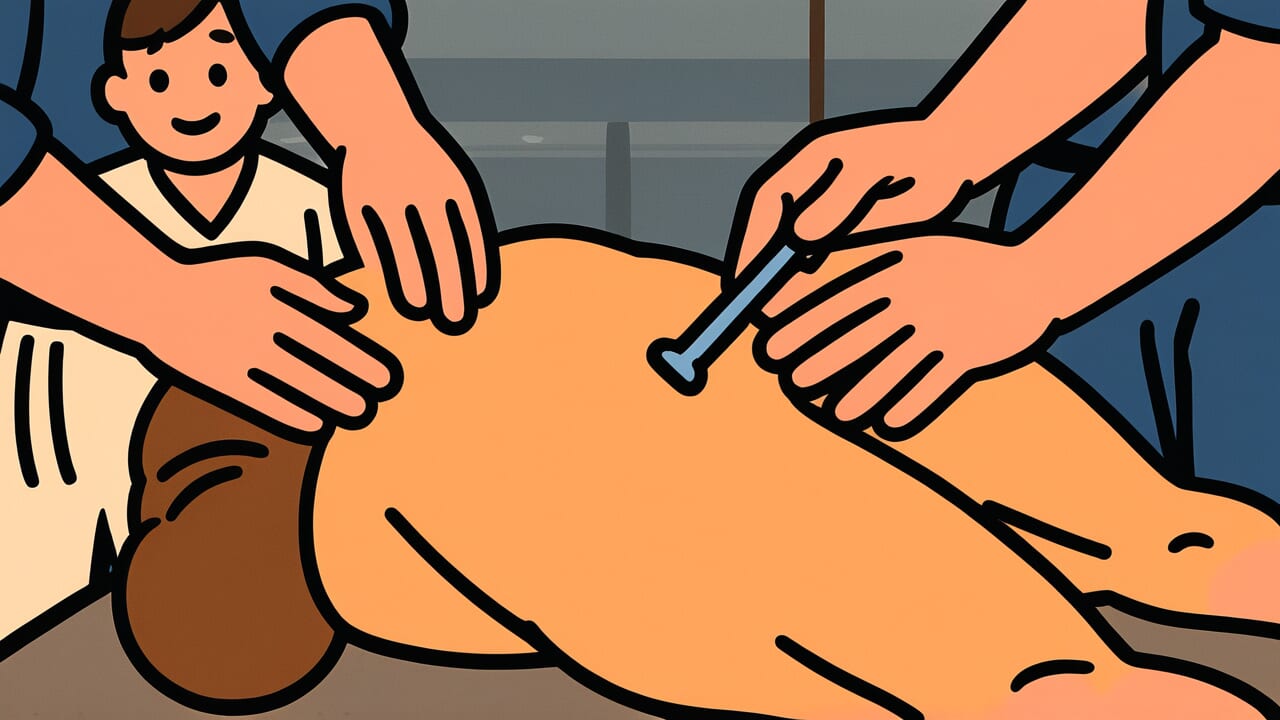How to Read “Pull out the buttocks hair”
Shirige wo nuku
Meaning of “Pull out the buttocks hair”
“Pull out the buttocks hair” means to take advantage of someone’s moment of carelessness and catch them off guard with an unexpected action.
This proverb describes the act of targeting the exact moment when someone lets their guard down and taking swift, unexpected action.
Just as you wouldn’t notice if someone plucked hair from your buttocks—a place you can’t see—this saying refers to accomplishing something quickly by exploiting a moment when the other person’s attention is elsewhere.
People use this expression when someone acts like they’re making a surprise attack, or when someone gets caught off guard and feels shocked.
It doesn’t always refer to malicious acts, but it does carry the nuance of taking advantage of someone’s defenseless state.
Even today, this proverb’s essential meaning of “catching someone off guard” still applies.
It works well for describing business situations where a competitor launches a new product at an unexpected time, or everyday moments when things happen when you least expect them.
Origin and Etymology
The origin of “Pull out the buttocks hair” has no clear documented record, but we can make interesting observations from how the phrase is constructed.
The core of this expression lies in the act of plucking hair from the buttocks—a part of the body behind you that you cannot see.
The buttocks is one of the most vulnerable parts of the human body. Even if someone plucked hair growing there, you wouldn’t notice right away.
When we think about common people’s lives during the Edo period, this expression was a remarkably clever metaphor.
People of that time used this striking physical image to describe sneaking up behind someone who’s off guard and doing something without being noticed.
The choice of the verb “pull out” deserves special attention.
Rather than simply “touch” or “look at,” using a word that expresses active behavior emphasizes the meaning of taking advantage of someone’s defenseless state to accomplish something definite.
This proverb is an example of the rich metaphorical expressions in Japanese.
It expresses the importance of vigilance in human relationships with a perspective that is both humorous and sharp.
Usage Examples
- That company launched their new product like pulling out the buttocks hair while we were still preparing
- He pulled out the buttocks hair by advancing the project while I was away on vacation
Universal Wisdom
The universal wisdom shown by “Pull out the buttocks hair” is the eternal struggle between vigilance and carelessness in human society.
No one can stay tense all the time. Everyone must relax and become vulnerable at some point.
And interestingly, there will always be someone in human society who doesn’t miss that opening.
This isn’t a matter of good or evil. It may be an instinctive human behavior pattern developed through survival competition.
This proverb has been passed down for so long because it sharply captures an essential tension in human relationships.
Trust and suspicion, cooperation and competition, security and vigilance—we live each day swaying between these conflicting emotions.
Thinking more deeply, this proverb also teaches the importance of “timing.”
The same action produces very different results depending on whether the other person is alert or off guard.
In life, deciding when to act is just as important as deciding what to do.
Our ancestors packed sharp observation skills for surviving in human society into this short expression, along with a humorous warning.
It still reflects an unchanging truth about human relationships.
When AI Hears This
The act of pulling out the buttocks hair contains a mechanism called a “commitment device” in game theory.
This is a strategy where you deliberately reduce your own options to draw out more favorable results.
For example, an army that burns its ships and cuts off retreat routes fights desperately because they can’t escape.
That determination communicates to the enemy and makes negotiations more favorable.
The pain of pulling out buttocks hair works the same way, functioning as “proof of seriousness.”
What’s important here isn’t the pain itself, but that the pain is irreversible. You can’t put pulled hair back.
As economist Thomas Schelling showed, humans sometimes gain negotiating power by “binding themselves.”
Some people sign expensive penalty contracts to quit smoking. This uses the same principle.
Research shows that leaving yourself no escape route statistically increases your probability of achieving goals.
What’s interesting is that this strategy only works if “the other person can see it.”
Pain that nobody knows about has no meaning.
Because pulling out the buttocks hair is a concrete and easily understood act, it works as a signal of seriousness.
In other words, this proverb represents the strategic wisdom of humans who deliberately choose pain as the cost of resolving information asymmetry.
Lessons for Today
This proverb teaches modern people two important perspectives.
The first is the importance of being aware of your own carelessness.
In our daily busyness, we unknowingly let our guard down.
Before important contracts, during big projects, or in moments when we’re drunk on success—these are exactly the times we need to stop and check whether our “buttocks hair” is vulnerable.
The second is understanding other people’s behavior patterns.
By accepting the reality that people will act when they find opportunities, we can build balanced human relationships.
We won’t fall into excessive optimism about human nature, but we also won’t become paranoid.
In modern society, information spreads instantly and competition intensifies.
That’s exactly why we need the difficult balance of maintaining constant tension while also valuing trust relationships.
Someone around you might be waiting for your moment of vulnerability.
But that’s also a chance for you to grow, become more careful, and become wiser.
Use this wisdom to walk through life shrewdly and confidently.



Comments